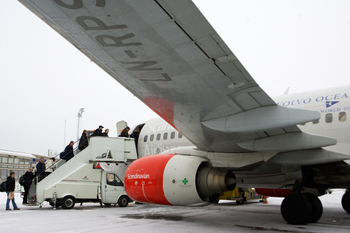Taxation in Finland

The general rule is that taxes are paid to the country where you work or receive income. If you live and work in different countries, your income may also affect your taxation in your country of residence. For this reason income must be declared both to your country of residence and the country where you work. The taxation in your country of residence will ensure that you do not pay double tax on the same income.
What taxes do you have to pay to Finland and when?
Your taxation in Finland depends on whether you are a resident or non-resident taxpayer, whether you live and work in a border municipality or whether you work remotely for a foreign employer or in several countries at the same time. You can find more information on the rules in different situations below.
Do you live and work in Finland?
If you both live and work in Finland, you are a resident taxpayer in Finland. For resident taxpayers, earned income is taxed progressively, meaning the tax rate increases as earnings increase. Taxable earned income includes wages, pensions and taxable social benefits. You can use the Finnish Tax Administration’s percentage calculator to check what your tax percentage is. Income from other countries cannot be entered in the calculator.
To pay taxes, you need a tax card. Read more about tax cards below in the section Tax card.
Do you live or work in another Nordic country?
If you live in a Nordic country and work in another Nordic country, you are usually a resident taxpayer in your country of residence and a non-resident taxpayer in your country of employment. Income must be declared in both countries, and double taxation is offset in the taxation of the country of residence. Read more on the Nordisk eTax website.
Non-resident taxpayers in Finland normally pay tax at source on their earned income. You can check your tax percentage on Nordisk eTax.
Non-resident taxpayers in Finland can apply for progressive taxation instead of tax at source, then the tax percentage is affected, among other things, by the amount of income and expenses during the year. With progressive taxation you are entitled e.g. to deductions for journeys between your home and workplace and deductions for the production of income. Read more on Nordisk eTax.
To pay taxes, you need a tax card. Read more about tax cards below in the section Tax card.
If you both live and work in Finland, read more on the Finnish Tax Administration’s website.
If you live or work in another Nordic country, read more about the rules that apply to you on Nordisk eTax.
If you are posted abroad, your employer must find out which country you pay your tax to as an employee.. Read more on the Finnish Tax Administration website.
The taxation of persons who live and work in border municipalities in Finland, Sweden and Norway is governed by the Nordic Tax Treaty. Cross-border workers are considered cross-border commuters within the meaning of the Nordic Tax Treaty only if certain conditions are met.
Do you live and work in a border municipality?
If you live in one country and work in another, your employment income is taxed in your country of residence on condition that you live in a municipality bordering the land border between Finland and Sweden or Finland and Norway and you work in a municipality bordering the same land border in the other country. You must also reside regularly - at least two days a week - in your permanent home in your home country.
The border municipalities between Finland and Sweden are, on the Finnish side, Tornio, Ylitornio, Pello, Kolari, Muonio and Enontekiö, and, on the Swedish side, Haparanda, Övertorneå, Pajala and Kiruna.
The border municipalities between Finland and Norway are, on the Finnish side, Enontekiö, Inari and Utsjoki, and, on the Norwegian side, Karasjok, Kautokeino, Kåfjord, Nesseby, Nordreisa, Storfjord, Sør-Varanger and Tana.
Read more on the Finnish Tax Administration’s website.
You don’t live and work in a border municipality?
If you live in one country and work in another country, but not in a border municipality, you generally pay income tax to your country of employment. Read more in the section Employees.
As a general rule in taxation, you are also liable for tax in your country of residence on income from your employment in another country. The income is generally also taxable in the country of employment. Income must be declared both to the country of employment and the country of residence, and double taxation is generally offset in the taxation in your country of residence. Read more on the Nordisk eTax website.
If you work for part or all of your working hours via a remote connection from Finland to another country, read the guidance on the Finnish Tax Administration’s website. If you work via a remote connection from another country to Finland, contact your local tax authority.
Finland does not tax student financial aid from other Nordic countries. Finnish study grant is also not taxed if it is your only income. Read more on the Finnish Tax Administration’s website.
If you live in another Nordic country but you get a pension from Finland, the pension is taxed in Finland. However, you must also declare the income in your taxation in your country of residence.
If you lived in Finland and received a pension from another Nordic country before 4 April 2008, your pension will be taxed in that country as long as you live in Finland without interruption. If you moved to Finland or your pension started after 4 April 2008, your pension from the other Nordic country will be taxed in Finland.
Read more on the Nordisk eTax website.
If you have assets or investments in another Nordic country, you can find information on how these are taxed on Nordisk eTax.
If you get inheritance or a gift from Finland, you can find information on how these are taxed on the Finnish Tax Administration’s website.
You can find more information on car taxation on the page Vehicles in Finland.
Will you be taxed twice?
You do not have to pay tax on the same income to two countries, but income must be declared both to your country of employment and country of residence. The Nordic Tax Treaty contains provisions on which Nordic country can tax income and how double taxation is avoided. Read more on the Nordisk eTax website.
Tax card in Finland
As an employee you must give your employer a tax card for PAYE tax deduction. If you do not submit a tax card, your employer is generally required to deduct 60% tax from your pay.
If you are a non-resident taxpayer in Finland, apply for a tax at source card for non-resident taxpayers. If you insist on progressive taxation of your income, apply for a tax card for non-resident taxpayers instead of a tax at source card. Read more about tax cards on Nordisk eTax.
You can find information on the different ways to apply for a tax card on the Finnish Tax Administration's website.
Tax return in Finland
Resident taxpayers and some non-resident taxpayers must submit a tax return in Finland.
Do you need to submit a tax return?
All persons living permanently in Finland, i.e. resident taxpayers who have had taxable income during the year, must submit a tax return the following year.
If you live permanently in another country, i.e. you are a non-resident taxpayer, you submit a tax return to Finland in the following situations:
- you have owned real estate or an apartment in a housing company during the tax year
- you have conducted business in Finland from a permanent establishment
- you have applied for progressive taxation instead of a tax at source card
How do you submit a tax return?
Taxpayers receive a pre-completed tax return by post in the spring. The form is pre-completed with details of your income, taxes and deductions. If you find that the details in the form are correct and there is nothing to add, you do not need to send the tax return back. If there are corrections to be made, you must notify the changes within the notice period.
The pre-completed tax return does not generally include foreign income. Income from other countries must be declared, however. Read more about tax returns on the websites of the Finnish Tax Administration and Nordisk eTax.
What if you move?
If you moved to Finland during the previous calendar year and you have not had a pre-completed tax return sent to your home address, you should ask the tax office for a tax return form. Read more about tax returns on Nordisk eTax.
If you have moved, you submit a tax return both to the country you moved from and the country you moved to. You must submit a tax return in Finland for as long you are as you are a resident taxpayer in Finland.
Finnish citizens who move abroad are usually resident taxpayers in Finland in the year of the move and the following three years. Tax residency can end earlier, however, if you can demonstrate that you do not have substantive ties to Finland in the tax year. You can read more about tax residency on the Nordisk eTax website.
More information
Please fill in our contact form if you have any questions or if you have encountered an obstacle in another Nordic country.
NB! If you have questions regarding the processing of a specific case or application, or other personal matters, please contact the relevant authority directly.




